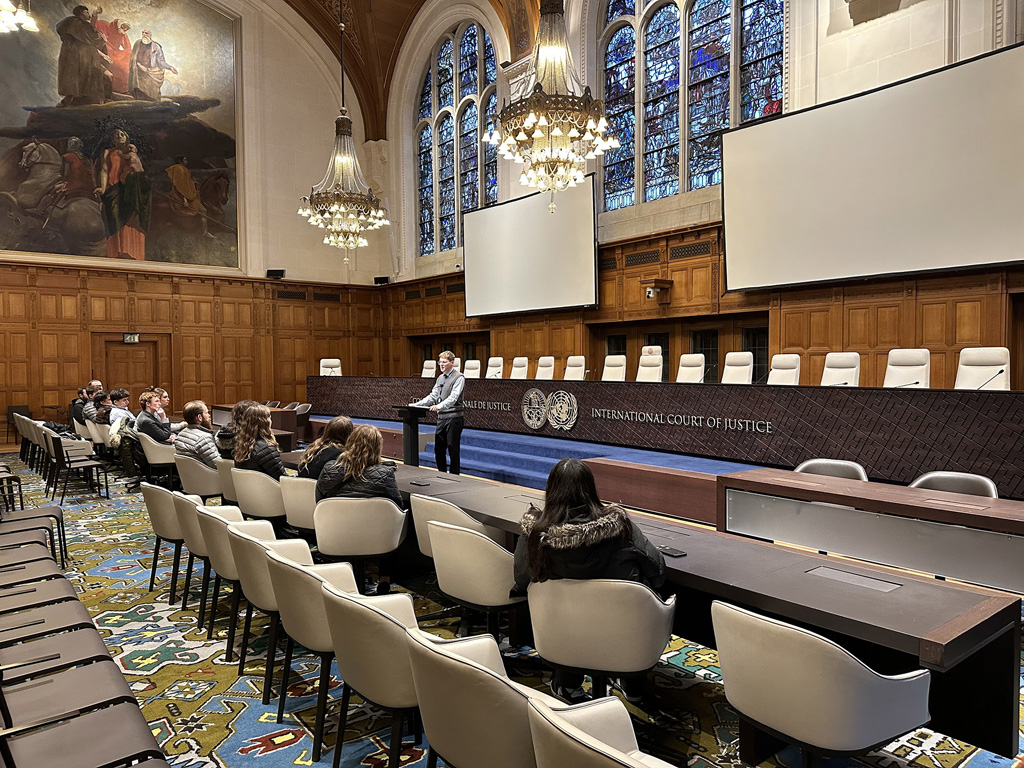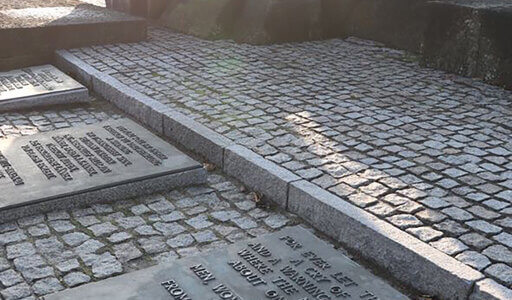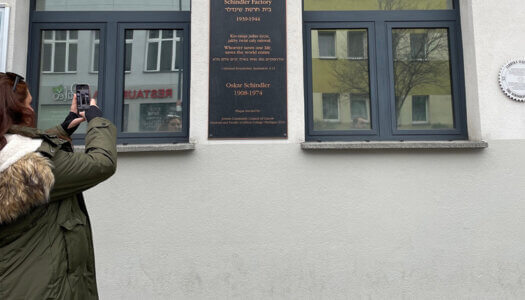
By TYLER ELLYSON
UNK Communications
KEARNEY – The best way to learn about international law is to experience it firsthand.
University of Nebraska at Kearney students had that opportunity during a recent field study course.
Eleven members of the Kearney Law Opportunities Program (KLOP) traveled to Europe during the January intersession as part of a new class created by political science professor and pre-law adviser Chuck Rowling. Titled “From the Holocaust to The Hague: The Evolution of International Humanitarian Law,” the course covers familiar topics from an entirely new perspective.
“We learn about the Nuremberg trials and we learn about the International Criminal Court, but to go there, see it and speak to people about it really brings to life what they’re reading about in textbooks and enhances the discussions we’re having in the classroom,” said Rowling, the department chair and KLOP director.
Accompanied by University of Nebraska College of Law Associate Dean Anthony Schutz and second-year law student Max Beal – both UNK graduates – the group spent two weeks in Poland, Germany, the Czech Republic and Netherlands during their in-depth look at Nazi war crimes and the subsequent development of present-day international criminal law.

The trip started in Poland with a focus on the Holocaust, the systematic murder of 6 million Jews by the Nazi regime and its allies during World War II. Students learned about the Jewish ghettos and forced labor camps before visiting the sites of the Krakow-Plaszow and Auschwitz-Birkenau concentration and extermination camps. Then they went to the Nazi Party Rally Grounds and Palace of Justice in Nuremberg, Germany, where leaders of the Nazi regime were put on trial following the war.
In The Hague, Netherlands, they visited and met with officials at the International Criminal Court and Kosovo Specialist Chambers, which have jurisdiction over modern-day war crimes and crimes against humanity, and the International Court of Justice, the principal judicial arm of the United Nations. They also attended a hearing for an alleged war criminal.
“They were powerful, profound experiences – each one of them,” Rowling said. “As a human being, you should care about these things. You should care about what’s being done on the international level when crimes against humanity and war crimes are committed.”
His students shared the same reflections.
“It’s important to have that background and understanding of history and to recognize its effects on the current world, especially with the Holocaust. Humanity needs to remember the Holocaust and the genocide so we can prevent it from happening again,” said UNK sophomore Ella Waller, a criminal justice and political science major from Riverdale.
Even though they were an ocean away, the students were able to draw connections to Nebraska and their future careers in the state.
“The more exposure students have in their undergraduate training to other places and other people, the better suited they are to make good choices about law school, their careers and where they want to be in the world,” Schutz said. “These students gained a lot of fundamental understandings that they’ll utilize in law school and beyond as they grow as professionals.”
Alex Chavez, a UNK junior from Bassett, called the trip an “eye-opening experience.”
“It was a once-in-a-lifetime opportunity that I really couldn’t get anywhere else,” said Chavez, who’s studying political science with a public law minor. “I enjoyed every part of the trip.”

EXPANDING HORIZONS
Beyond the built-in educational components, the experiential learning course gave students a chance to explore new locations and interact with people from different backgrounds.
“Studying abroad exposes students to cultures they may not be familiar with and allows you to meet people from different walks of life,” said Waller, who had never traveled outside the U.S. before. “It’s definitely an experience that I’m going to remember for the rest of my life.”
In addition to the stops related to international law, the group stayed in Prague and Amsterdam, giving them time to relax and bond with each other. That relationship-building was another important part of the trip, since students in the KLOP program transition to the Nebraska College of Law after graduating from UNK.

“When they get here, the better they know me and the better they know our students, the better situated they are to succeed in law school,” Schutz said.
Rowling agrees.
“My goal with the KLOP program is for these students to really know what they’re getting into by the time they go to law school,” he said. “And what better way to do that than to have them in these spaces talking to not only a professor but also a current law school student in his second year. For them to be together like this, that’s only going to create stronger bonds amongst them and enhance their experience not only at UNK but when they go to law school as well.”
The European field study course will be offered every two years, with an opportunity to learn about the civil rights movement in the Southern U.S. available during the alternating intersessions.
Waller and Chavez both plan to sign up for next year’s trip.
“It definitely expands your horizons,” said Chavez, who completed a field study course in Northern Ireland with Rowling last summer. “Had I not gone on trips like these during college, I think I would live a lot more close-minded life.”
Rowling credits the UNK administration for recognizing that value. Thanks to financial support from the Chancellor’s Office and other entities on campus, last month’s trip only cost each student about $1,000.
“When you come to UNK, you’re not only going to get those great classes with great faculty, but you’re also going to get outside the classroom and have all of these other experiences,” Rowling said. “By the time you get to law school, you’re going to be a much more well-rounded student.”


















